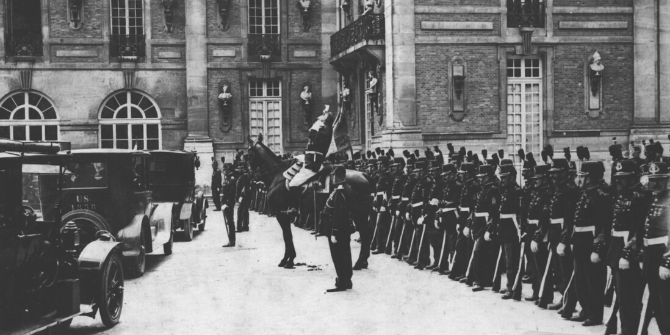 What is to be done in the face of crisis, when the very trope of crisis curtails our ability to imagine what might be possible, beyond a narrow horizon of diminished expectations? Max Haiven and Alex Khasnabish confront a ‘crisis of social reproduction’ shaped by the crash of 2008 and the war on terror. They find the imagination hobbled, tethered to individualized dreams of enrichment or escape from precarity. What seems to be missing from North Atlantic social movements – and society at large – is The Radical Imagination, a process of collectively envisioning alternative futures based on analyses of the root causes of social problems. Committed social researchers are tasked with ‘opening the time for the imagination’ in the landscape of perseverance that is populated by social movements caught between success and failure, writes Paul Gilbert.
What is to be done in the face of crisis, when the very trope of crisis curtails our ability to imagine what might be possible, beyond a narrow horizon of diminished expectations? Max Haiven and Alex Khasnabish confront a ‘crisis of social reproduction’ shaped by the crash of 2008 and the war on terror. They find the imagination hobbled, tethered to individualized dreams of enrichment or escape from precarity. What seems to be missing from North Atlantic social movements – and society at large – is The Radical Imagination, a process of collectively envisioning alternative futures based on analyses of the root causes of social problems. Committed social researchers are tasked with ‘opening the time for the imagination’ in the landscape of perseverance that is populated by social movements caught between success and failure, writes Paul Gilbert.
 The Radical Imagination: Social Movement Research in the Age of Austerity. Max Haiven and Alex Khasnabish. Zed Books. 2014.
The Radical Imagination: Social Movement Research in the Age of Austerity. Max Haiven and Alex Khasnabish. Zed Books. 2014.
A casual flick through the business press might invite the notion that we live in a world that holds the imagination in high regard. Ed Catmull’s Creativity Inc. has made the 2014 Business Book of the Year shortlist, and the imagination has been declared a nation’s ‘greatest domestic renewable resource’ by management gurus Eric Liu and Scott Noppe-Brandon.
For Max Haiven – Assistant Professor of Art History and Cultural Studies at the Nova Scotia College of Art and Design – these would be symptomatic of a highly restrictive and increasingly pervasive financialized imagination. If the imagination is that which allows us to collectively understand social life and act with respect to shared futures, then the risk-laden language of finance has become the parlance through which contemporary North Atlantic societies extend their limited imaginative horizons. Risk-takers are enticed to ‘imagineer’ profitable financial frontiers, while members of what Haiven calls the ‘creditariat’ must learn to manage themselves as carefully rated financial subjects, or risk foreclosure on their life-chances.
Haiven explores cultures of financialization and the financialized imagination in more detail elsewhere, but in The Radical Imagination he is joined by fellow Nova Scotia-based anthropologist Alex Khasnabish – known for his writings on activism and Zapatismo – to explore the relationship between the radical imagination, social movements, and contemporary social research. Reflecting upon the Radical Imagination Project which they have co-directed in Halifax, Nova Scotia since 2010, Haiven and Khasnabish outline a generalized crisis of social reproduction, conditioned by the politics of security and austerity that were ushered in as responses to financial meltdown, the war on terror, and a slow-motion ecological collapse. Their understanding of this crisis of social reproduction draws on the radical feminism of Maria Mies, who recognized that if capitalism were “actually to remunerate reproductive housework, the system would collapse” (p. 103). In other words, labour recognized as a marketable commodity is always dependent upon caring, supportive and collective work that goes uncompensated in the market (a notion captured neatly by J. K. Gibson-Graham’s image of the ‘economic iceberg‘).
The austerity politics of recent years have “downloaded” (p. 32) the hard-won subsidies for reproductive labour previously provided by public health-care, pensions and education back onto members of the emerging precariat, who are entreated to diminish their expectations and curtail their imaginative horizons by those operating under the sign of ‘crisis management’. Caught between an individualized, financialized imagination and crisis-talk that narrows the future into an endless now, it is the radical imagination (where ‘radical’ reflects its Latin origins in radix, or ‘root’) – “the ability to envision and work towards better futures based on an analysis of the root causes of social problems” (p. 61) – that atrophies, and which the authors seek to resuscitate. Haiven and Khasnabish make it abundantly clear that ‘radical’ is not a value judgement, nor does the radical imagination occupy a particular or necessary point on the political spectrum. Indeed, radical social movements may include those that Haiven and Khasnabish “have little time for or loathe” (p. 24). A radical social movement in their understanding is therefore one which goes beyond merely making demands on an existing social order (pp. 48-53). It is one which enacts the kind of ‘prefigurative politics‘ that were at the heart of the Occupy movement, and which seek to constitute alternative modes of social reproduction through their organization and operation.

The Radical Imagination is given coherence by Haiven and Khasnabish’s parallel explorations of success, failure, and temporality in social movements and contemporary social research. What emerges is a call not only for prefigurative politics, but ‘prefigurative research’ that starts by imagining what research might look like in a “revolutionary world-to-come, bringing those forms, methods, ideas and orientations ‘back’ into the present” (p. 248). Taking up the notion that social research is a vocation – or “being called to a voice” (p. 56) – Haiven and Khasnabish reject social movement research that rests upon ‘invocation’, or the use of academic prestige to amplify the voices of social movement participants. As they note, in an “era of academic hyper-production, most of our colleagues don’t even have the time to read our work” (p. 59), so how successful could such an ‘amplification’ be? Equally, they reject ‘avocation’, or the placing of scholarly capacities entirely at the disposal of social movements, since this entails a repudiation of the “odd (almost perverse) freedom and the critical element of ‘play’ that is in many ways unique to university-based researchers in an age where neoliberalism has dramatically confiscated almost all other forms of critical intellectual autonomy” (p. 135). Instead, they endorse ‘convocation,’ a strategy of working with the research practices that are always already ongoing within social movements, in order to make space – or rather, make time – to call forth the radical imagination.
Jagdish Bhagwati, in the absence of irony, argues that “Capitalism works best when those who do not succeed, and are buffeted by the vicissitudes of life, still believe in success.” And, Haiven and Khasnabish note, to be successful in the present order is “to somehow synchronize the reproduction of capital with the reproduction of our individual lives” (p. 111), with success being typified by the “savvy university graduate who translates years of unpaid internships into a job in cognitive and creative capitalism,” or the “powerful businessman with his devoted wife and a social conscience.” Failure is nothing less than the failure to integrate these two cycles of reproduction. In the constrained financialized imagination, perceived insulation from failure comes in the form of the middle class ideal of stable housing, health-care and old-age security. And it is the seduction of an individualistic middle class escape from the crisis of reproduction that constitutes the single greatest obstacle to the collective “ability to imagine and reproduce the world otherwise” (p. 144). Drawing on Judith Halberstam’s queer theory of failure, and ‘squaring’ the success/failure opposition to include not-failure and not-success, Haiven and Khasnabish focus not on the ‘gains’ of policy changes or campaign victories (which lie between success and not-failure, and are paralleled by the researcher’s securing of ‘results’). Instead they turn to the utopian future that lies between success and failure, and the everyday ground of social movement practice, situated between not-success and not-failure.
The work of convoking the radical imagination is thus to take place in the gap between not-success and not-failure, a hiatus exemplified by the pregnant pause that confronted Haiven and Khasnabish when they asked participants in the Radical Imagination Project: What would it mean to win? And the work of the researcher is to help create time for the cultivation of the radical imagination within this hiatus, a task that is as important as it is at odds with an academic culture committed to the production of ‘results’, ‘deliverables‘ and other ‘gains’. Haiven and Khasnabish are not the only anthropologists who have rejected research methodologies designed to produce retrospectively descriptive ‘data’, and called for collectively fashioned ways of knowing tied to the “essentially prospective task of helping to find a way into a future common to us all,” as Tim Ingold would put it. The Radical Imagination is, however, among the most rigorously theorized and carefully put together – and imaginative – of these efforts. To read it, for those who already dwell between not-success and not-failure, is to begin to make time for the convocation of the radical imagination. Don’t squander it.
Paul Gilbert is a PhD Candidate in Social Anthropology at the University of Sussex. His research focuses on the anthropology of markets, natural resources and alternative finance, and he has previously published on these topics based on research carried out in Bangladesh, Papua New Guinea and the United Kingdom. Read more reviews by Paul.








2 Comments